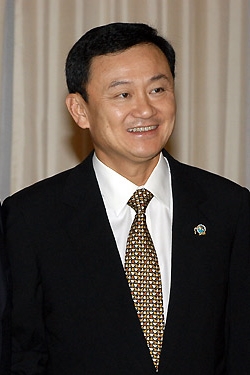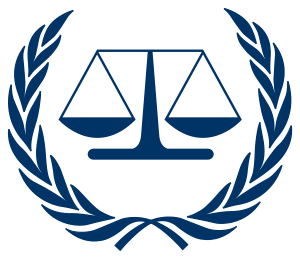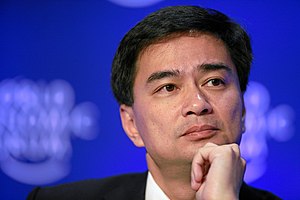 Image via Wikipedia“My life is really relaxed,” he said Thursday. “I have lots of people coming to see me.” On Thursday, that included his Canadian lawyer, Bob Amsterdam, as well as a delegation from Thailand, which remains a country of deep political divisions heading into an election year.
Image via Wikipedia“My life is really relaxed,” he said Thursday. “I have lots of people coming to see me.” On Thursday, that included his Canadian lawyer, Bob Amsterdam, as well as a delegation from Thailand, which remains a country of deep political divisions heading into an election year.Life in self-imposed exile is pleasantly laid back and far from lonely, says Thaksin Shinawatra, Thailand’s deposed prime minister, who remains a hero to many in that country’s “Red Shirt” movement.
The 61-year-old former leader has kept a low profile since being ousted in a military coup Sept. 19, 2006, but spoke to the Toronto Star in an exclusive interview from his Mideast exile.
It endured its worst violence in recent memory last spring when Thaksin’s red-shirted supporters poured into the streets of Bangkok to demand elections and protest the government of Prime Minister Abhisit Vejjajiva and stayed there for almost two months.
Clashes with the Thai military left 91 dead and an estimated 1,800 wounded and led to eight months of emergency rule.
 Image via WikipediaThaksin, meanwhile, has been living a peripatetic life since 2008, when he failed to return to Thailand from the Beijing Olympics, after a Thai court had convicted him on corruption charges and sentenced him in absentia to two years in jail.
Image via WikipediaThaksin, meanwhile, has been living a peripatetic life since 2008, when he failed to return to Thailand from the Beijing Olympics, after a Thai court had convicted him on corruption charges and sentenced him in absentia to two years in jail.Reports from Bangkok last week said a group of Pheu Thai party members were travelling to meet with Thaksin and discuss who should assume the opposition party’s leadership.
Thaksin, a former billionaire businessman, distanced himself Thursday from direct involvement in any political movement.
He insisted he is not advising members of the United Front for Democracy Against Dictatorship (UDD), the formal name for the Red Shirts, who enjoy wide support among Thailand’s rural poor and working class. “I don’t know them,” he said.
 Image via WikipediaBut Thaksin also said Abhisit’s conservative coalition government, largely supported by Thailand’s wealthier urban population, must sit down with UDD leaders to discuss their concerns.
Image via WikipediaBut Thaksin also said Abhisit’s conservative coalition government, largely supported by Thailand’s wealthier urban population, must sit down with UDD leaders to discuss their concerns. The British-born Abhisit promised a reconciliation process last May. “Reconciliation would mean that you have to talk,” Thaksin said. “And find a solution to bring democracy back. Reconciliation does not mean you get rid of leaders and bring their followers to jail.” The UDD, meanwhile, is putting the finishing touches on a complaint it plans to file this month with the International Criminal Court, urging that the Thai government be indicted for crimes against humanity in connection with last spring’s deadly demonstrations.
 Image via WikipediaThaksin is not among the complainants but is contributing to the UDD’s legal expenses, Amsterdam said Thursday. Thaksin’s own human rights record, meanwhile, has been called into question by Amnesty International.
Image via WikipediaThaksin is not among the complainants but is contributing to the UDD’s legal expenses, Amsterdam said Thursday. Thaksin’s own human rights record, meanwhile, has been called into question by Amnesty International. The agency has asked for independent investigations into the deaths of more than 80 people killed when his security forces tried to suppress suspected insurgents in southern Thailand in 2004, and another 2,500 killed in a crackdown on suspected drug traffickers. But his popularity remains high in the countryside because of policies that included micro-lending programs, erasing farmers’ debts and a form of universal health care. “Their life has been changed.
 Image by AlicePopkorn via FlickrTheir happiness has been taken away,” Thaksin, who won two elections, said Thursday. “They just want me back.” His convictions and jail sentence were “really, really politically motivated” by the “military junta government” and his opponents, Thaksin added.
Image by AlicePopkorn via FlickrTheir happiness has been taken away,” Thaksin, who won two elections, said Thursday. “They just want me back.” His convictions and jail sentence were “really, really politically motivated” by the “military junta government” and his opponents, Thaksin added. “They really planned to lock me out of Thailand and don’t want me to go back.” The challenge for any leader is bridging the enormous economic and political gulf between rural Thais and the Bangkok elite, said Peter Vandergeest, who teaches at York University’s Centre for Asian Research. Thaksin agrees.
“Thais are really peaceful,” he said. “They have to have a solution so that the people of Thailand can live together and no division.”

No comments:
Post a Comment